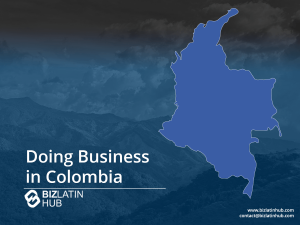Colombia’s national persona can be characterized by its artistry, rich culture, and its creativity. The ideologies of expression and imagination are perhaps a semblance to the country’s vibrant and dynamic landscape. The ‘orange economy’ was born out of recognition of Colombia’s natural creative ability.
The orange economy is an economic movement currently worth USD$10.8 billion to Colombia’s economy (roughly 3.5% of national GDP). To contextualize its significance, it’s worth noting that much of Colombia’s urban regeneration, particularly in the cities of Cali and Medellín, have largely come down to the efforts of its creative industries. The ‘creative industries’ is the broad definition. It outlines all the industries which require a degree of innovation, invention or conceptualization to make money.
However, looking to the future of this economy is Colombia’s president, Iván Duque. In Duque’s co-written book, The Orange Economy: An Infinite Possibility, he believes the creative industries hold greater potential than their current output, and can draw in more investors considering doing business in Colombia. He envisages this movement growing to 10% of Colombia’s GDP in the next 20 years, eventually equaling the GDP contribution of manufacture.

What does the ‘orange economy’ mean for doing business in Colombia?
The phrase ‘orange economy’ was coined by Colombia’s president Iván Duque during his time with the Inter-American Development Bank. The orange economy is made up of the export of creative goods and services. Although a phrase derived from Colombia, the orange economy is now a concept recognized worldwide. Despite the recent progress of the creative economies in other nations around Latin America, Colombia remains the leader in the creative industries.
When Duque assumed the role of president in 2018, he announced his ambition to greater channel and formalize the country’s creative economy, to encourage a greater desire to do business in Colombia. This movement was something he strongly advocated whilst a senator. The formalization of the creative industries was in order that the country better-leverage the industry’s production and exports. By putting in place a more rigid framework to the creative industries, Colombia is expected to grow this wave of ideas, interpretations, and habits into a flourishing branch of their economy.
The formalization process consists of looking at the sector under a magnifying glass, organizing the industries into categories and identifying the industries doing well and the ones which need more help. From here the government is able to create tax and business opportunities for the specific groups within the creative market.
How is the orange economy organized?
The orange economy encompasses a broad range of industries right from fine art to software creation. To delineate the differences and to organize them into different fiscal incentive schemes, the Colombian government have divided the creative industries into three subcategories:

Category 1: The Arts
This category includes industries such as the visual arts (painting, sculpture, photography), the performing arts (theatre and dance), musical arts (operas, concerts and festivals), as well as tourism and gastronomy.
Category 2: Cultural Industries
Category 2 includes all of the goods and services which benefit from Colombia’s culture and can be mass-produced. This includes literature, magazines, radio, television and recorded music.
Category 3: New Media
This category is made up of products or services containing new media and content software. Within this category is video game production, software, and application development as well as graphics, fashion and advertising.
Government policies favoring the orange economy
Between the years 2002-2011, Colombia’s orange economy as a whole grew by 134%, most of which was contributed by category three, specifically the technology and innovation sectors. However, as the market continues to expand, and as legislation is made more favorable more investment opportunities are becoming available.
In September 2019, Medellín held the world’s first Orange Economy summit. Three experts of creative economics attended the summit: Andrs Roemer, Rahaf Harfoush and the pioneer of the Creative Economy Concept, John Howkins. The three of them highlighted two necessary reforms for the further growth of Colombia’s creative economy.
Orange economy tax incentives

In Duque’s view, the orange economy is the key to the continued growth and expansion of Colombia’s economy. His drive and determination to ensure the sector succeeds is manifested in the new favorable tax laws put in place in January this year, to boost the ease and appeal of doing business from 2019 onwards.
The tax reforms advocate the growth of the creative sector through a series of tax incentives and advantages for new creatively thinking businesses.
Tax incentives for the orange economy include:
- 5-year income tax exemption (if income is less than USD$900,000 per annum)
- Exemption from VAT on the import, production or purchase of fixed assets
- Access to credit capital at favorable rates
To qualify for these incentives, the business must comply with the following:
- The company’s principal domicile must be in Colombia
- The corporate purpose has to be in the development of technological value-added industries and/or creative activities
- The company must be fully incorporated and start its economic activity before December 31, 2021
- The company must have at least 3 employees
- The company must present their business concept to the Ministry of Culture.
- The company must be investing a minimum of roughly USD$46,000 back into the company every year for a minimum period of 3 years.
Expand to Colombia with Biz Latin Hub
Colombia is one of the fastest-growing economies in Latin America; it’s a nation with a welcoming approach to foreign investment. On top of that, no market in Colombia is more enticing at present than the orange economy. It is currently one of the most incentivized markets in Colombia. The country’s current President is also one of the leading pioneers of creative business growth and the industry’s greatest supporter.
Biz Latin Hub offers legal and accounting services to foreign businesses in Latin America. Our large team of experts in Colombia specializes in market entry and company incorporation, and can facilitate your expansion into this exciting market.
Get in touch with us now and we can put your creative idea into a creative market.
Learn about our team and expert authors, and check out our short presentation on why Colombia is a top choice for investors doing business in Latin America.






